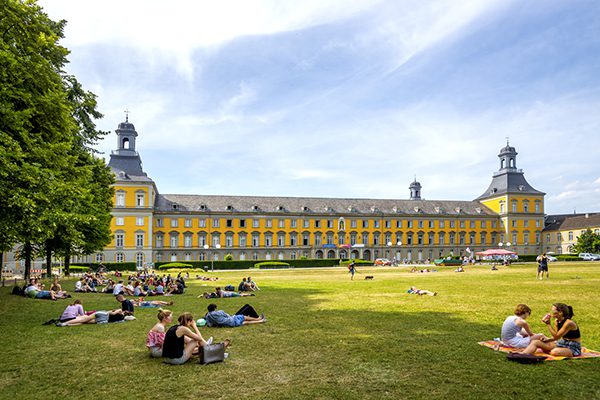While many people focus on the education system in Germany, private universities in the country give international students special benefits. Because of their personal support, English courses, and good industry partnerships, private universities in Germany have drawn in more people looking for a career-oriented education.
Best private universities in Germany: Advancements Made in German Private Higher Education in 2025
Private colleges and universities in Germany have gone through major transformations these days. There are now over 100,000 students at the International University of Applied Sciences, making it the largest university in Germany. It is clear from this rise that more people in Germany are choosing private education.
With more than 15,000 students from different countries, BSBI has become one of the fastest-growing private institutions in Germany. More people pursuing business education with a global focus is what led to the growth of the institution.
Many German private universities are adding more English-taught programs for the upcoming year, and the GISMA Business School is introducing new master’s degrees. With this approach, non-German-speaking international students can enroll in private German schools as well.
Students at private universities tend to need more financial support, since tuition ranges from €9,000 to €40,000 per year, again depending on the university’s and program’s specifications8. Still, numerous private universities have scholarships and flexible ways for students to pay their tuition fees.
IU is currently leading the use of blended learning, which involves teaching both online and on campus. The model enables students to work or engage in other activities while still attending classes.
Are private universities in Germany on your mind? Let’s look at the top universities, their most distinctive features, and what puts them on the map in 2025.
Learning about Private Universities in Germany in 2025
German private universities have a different approach from their public universities. They rely on private finances and are managed by individuals, giving students fewer students in each class and more occupationally relevant subjects. While public universities offer low tuition fees, private institutions have a higher price but improve students’ experiences and support with better facilities and connections with notable companies.
Since many private universities in Germany have programs taught only in English, they draw a lot of international students. This helps talented students from other countries study in Germany, even if they don’t speak German. Private universities are more flexible when considering who to admit than public universities, which usually demand a high level of academic achievement.
Blended learning, which is practiced at Indiana University, allows students to study in different ways, both on campus and online. This gives students the chance to study in a way that works for them, be it by continuing to work or picking a preferred style of study.
German private universities are recognized for offering hands-on courses and having strong industry relationships. A number of programs include practical assignments or internships for students to gain practical experience ahead of their graduation. Because of their practical training, graduates find it easier to start working after school.
10 Top Private Universities in Germany for International Students in 2025
1. IU International University of Applied Sciences
With around 100,000 students located at various campuses and online, IU is Germany’s biggest private university. There are several English-language career degrees available at the university, which is also affordable compared to other private universities. With IU’s model, students can participate in on-campus lessons as well as online, giving them unparalleled flexibility.
Among its many achievements, IU is most impressive because 94% of its graduates start working within 3 months of finishing school. The high success rate reflects how positive and relevant the education is.
- Tuition for programs is €12,000 a year for Bachelor’s and €13,000 for Master’s.
- Location: You can find me in Berlin, Bremen, Erfurt, Düsseldorf, Hamburg, Frankfurt, Leipzig, Cologne, Bad Honnef, and plenty of other cities.
- Many students choose to study Business Administration, Computer Science, Engineering, or Hospitality Management.
2. WHU – Otto Beisheim School of Management
Being one of Germany’s foremost private business schools, WHU is consistently recognized around the world as a top business school. Urbach specializes in business and management education and enjoys strong connections to various companies, located in Vallendar and Düsseldorf.
This university is famous for its tough academics, worldwide focus, and involvement with the business world. WHU’s MBA courses are respected, leading to a global mix of students.
- Tuition for Bachelor’s degree programs ranges from €17,000 to around €47,500 for an MBA
- The chapters are set in Vallendar and Düsseldorf.
- Business Administration, Management, Finance, and MBA are well-known degrees.
3. EBS University of Business and Law
EBS University in Wiesbaden and Oestrich-Winkel is considered among the top private business schools in Germany. Started in 1971, it remains the oldest private business university in Germany. EBS’s programs in business, law, and management focus on hands-on skills and include global experiences.
Many of the courses at the university are focused on entrepreneurship and leadership to help students succeed in different industries. Students at international universities benefit from the opportunities for exchange and international internships.
- The average tuition fee for a Bachelor’s program is €18,000 annually and from €20,000 to €24,000 for Master’s programs.
- The sites are located in Wiesbaden and Oestrich-Winkel.
- There are many popular programs offered in business administration, law, finance, and real estate.
4. The Jacobs University in Bremen
Jacobs University in Bremen is a private institution that provides courses in engineering, humanities, natural sciences, and social sciences. There are students from 100 different countries at this campus, creating a truly international atmosphere. Selecting students is competitive at the university, and research is of a high standard.
Students live and study in the same place, fostering a close relationship among them. As a result, students from various countries join forces and learn about each other’s cultures.
- Yearly tuition costs at public universities range from €10,000 to €20,000.
- Location: Bremen
- In Europe, the country holds the 4728th spot.
- Among the most popular fields are Computer Science, Robotics, International Business, and Psychology.
5. Berlin School of Business and Innovation
The institute is in downtown Berlin and works to ensure students are ready for an international career. As it enrolls over 15,000 students, it provides a range of programs, mainly focused on business topics. Students can attend classes in person or online, depending on the course.
Since it is located in Berlin, a lively European city, BSBI gives students the opportunity to experience a great business environment and culture. The international backgrounds of the professors at the university add diversity to the classroom.
- Tuition Fee: Up to €9,000 for each year of study
- Location: Berlin
- In Continental Europe, this country is ranked at 3508.
- Business Administration, Marketing, and International Management are some of the most popular programs offered.
6. Munich Business School
Established in 1991, Munich Business School (MBS) is an accredited and state-approved private university recognized by the German Council of Science and Humanities. With only 700 students, the business school provides a learning environment that is attentive to individual students.
Being in a leading German region, MBS allows students to connect with important companies and other individuals. Being a small school encourages students and teachers to interact closely.
- Tuition for undergraduate students is €38.7 to 40.1 Lakh, and for postgraduate students it is €23.1 to 22.9 Lakh (for the entire program)
- Location: Munich
- There are lots of good courses in Business Administration, International Business, Sports Business, and Innovation Management.
7. GISMA Business School
Since its foundation in 1999, GISMA Business School has been recognized for offering the AMBA-accredited Global MBA. The school is committed to teaching international business and maintains relationships with industry contacts.
Students at GISMA are taught both the theory and the practical skills needed to become leaders in companies worldwide. Students are able to interact with the thriving Berlin startup scene because of the school’s location.
- The cost of tuition for undergraduate courses is €9,000 a year, while postgraduate tuition ranges from €12,000 to €22,4009
- The locations are Hannover and Berlin.
- Business Administration, Marketing, Finance, and MBA are some of the most popular programs.
8. Witten/Herdecke University
UW/H was founded in 1983 and led the way in introducing private universities to Germany. In these areas of economics, management, medicine, psychology, and nursing, the university focuses on new teaching and research approaches.
At UW/H, students are encouraged to explore subjects from multiple disciplines and look at them from different angles. The medical education at the university is respected, as it focuses on more than just medicine.
- Tuition Fees: You could pay up to €17,000 every year.
- Location: Witten
- European Ranking (AU) = 4998
- Medicine, Economics, Psychology, and Management are some of the popular programs.
9. SRH Hochschule Berlin
As part of the SRH group, SRH Berlin University of Applied Sciences is an approved private educational and health organization by the state. English-taught bachelor’s and master’s programs in technology, management, media, and creative industries are available at the university.
At SRH, students use the CORE Principle, which focuses on learning by doing real-life projects. Because of the university’s solid ties to industry, students can find internships and jobs.
- Your tuition will be €5.1L each semester if you study at the undergraduate level and €6L each semester if you join a postgraduate program.
- Berlin, Heidelberg are the locations of these events.
- Some of the most popular programs are International Management, Computer Science, and Media Design.
10. Bard College Berlin is a place where students from all over the world come together to study in 2025
Bard College Berlin is an accredited institution in Germany that teaches liberal arts. Since the average number of students per class is 11 and the student-faculty ratio is 11:1, learning is very personalized. There are undergraduate and one-year courses, taught completely in English, available at the university.
Through critical thinking and learning about different fields, students prepared by a liberal arts education are prepared for various jobs. Due to the small size of the university, students develop strong bonds with their professors.
- Around €30,000 needs to be paid in tuition fees per year.
- Location: Berlin
- The most popular programs are Economics, Politics, Art History, and Literature.
Examining the Differences Between Public and Private Universities in Germany in 2025?
Deciding on whether to attend a public or private university in Germany depends on several points.
| Aspect | Public Universities | Private Universities |
| Tuition Fees | Minimal (€0-500 per semester) | Higher (€9,000-€40,000 per year) |
| Class Size | Larger classes | Smaller classes, personalized attention |
| Language of Instruction | Mostly German, limited English programs | Many English-taught programs |
| Admission Requirements | More stringent, competitive | Often more flexible |
| Industry Connections | Varies by institution | Strong industry partnerships |
| Study Models | Traditional on-campus | Innovative formats (blended, online options) |
| International Environment | Varies by location | Highly international student body |
Education at public places such as the Technical University of Munich and Ludwig Maximilian University is of high quality and very affordable, whereas private universities in Germany give more attention to students and are more costly.
Selecting a public or private university depends on your tastes, financial situation, and what you want to study. If you want a smaller group of students, work-based lessons and classes in English, considering a private university could be wise.
How to Apply for Admission at Private Universities in Germany in 2025
It is typical for private universities in Germany to request admission requirements such as:
A Bachelor’s program requires a high school diploma or its equivalent.
- Some Master’s programs require students to have a bachelor’s degree.
- For each program, you need to be proficient in English or German.
- Entry requirements (for some educational institutions)
- Recommendation letters
- Motivation letter
- You may have to complete an interview for some degree programs.
It is generally easier to get admitted to private universities than to public universities. Several universities, including IU International University, provide a fast and stress-free way to complete their online applications. This approach can help international students who find it more complicated and delayed when trying to apply to public universities.
Typically, private universities have their own requirements for specific subjects and analyze your GPA more thoroughly than public universities. Alternatively, they could rely more on documents such as personal statements and recommendations to understand all aspects of a person’s case.
In most cases, you will be required to take the TOEFL or IELTS tests to prove your English proficiency for English-taught programs. If you opt for a German-taught program, you need to submit TestDaF or DSH certificates. If your previous education was in the required language, some universities won’t require you to meet their language standards.
One reason IU International University of Applied Sciences is unique is that it has a streamlined admission process. Because there are no entrance exams or interviews, the university’s online application is open to all students from overseas.
How to Pay for a Private University in 2025?
Private universities in Germany tend to charge more in tuition than public ones, but there are several ways for students to cover these costs.
Scholarships
A range of private universities provides both merit-based and need-based scholarships to students from other countries. With these, studying at private institutions may cost less. At Bard College Berlin, 79% of students are given financial aid.
Student Loans
Students in Germany can apply for loans offered by both German and foreign banks to help cover their tuition. Those who wish to study in Germany can find loans at favorable terms offered by German banks or seek loans from their home country.
Payment Plans
The majority of universities allow students to spread their payments out over time instead of paying everything at once. It becomes simpler for international students to manage their finances since they won’t have to worry about currency exchange and transfer problems.
Work-Study Programs
Some universities assist students by providing jobs where they can earn money to support their living costs and pay for classes. Students from other countries are allowed to work part-time in Germany during their studies (up to 120 full days or 240 half days annually).
External Funding
Several organizations and foundations give support to international students by offering funding. For example, DAAD in Germany provides many scholarships for students from different countries.
Compared to other private universities in Germany, IU International University of Applied Sciences offers affordable tuition. You can study at IU for just €12,000 per year for a Bachelor’s program and €13,000 for a Master’s. Students can also pay in monthly installments, which makes the university more affordable for them.
Job opportunities and achievements after graduation in 2025?
Many private universities in Germany have developed effective career services and strong connections with their alumni. Many have formed relationships with prominent companies that give their students access to internships and jobs.
According to IU International University of Applied Sciences, 94% of its students secure jobs within three months after finishing their programs. This statistic proves that private universities effectively prepare their students for professional careers.
Many private universities have strong links with leading industries, so their students usually find it easier to obtain jobs after they graduate. Many schools have programs that involve students working with companies on projects to provide them with experience and useful contacts.
Notable graduates from German private universities are:
- Christian Sewing (CEO, Deutsche Bank) is associated with EBS University.
- Oliver Samwer (CEO, Rocket Internet) – WHU8
- Dr. Florian Fischer (Founding Partner and CTO, Arcensus GmbH) from Jacobs University Bremen
- Isabel Schnabel (Member of the Executive Board, European Central Bank) – Jacobs University Bremen
- Tina Müller (CEO, Douglas) – EBS University
- GISMA Business School has Simone Menne (Board Member, Lufthansa Group) as part of its faculty.
Graduates of private universities in Germany like these can serve as examples of the excellent education given and the many career paths available.
Sometimes, private universities host resume workshops, prepare students for interviews, organize job fairs, and hold networking events for their students. They assist students in adapting to their new jobs after finishing school.
Conclusion
If you are an international student wishing to study in English, receive individual care, and build important industry links, you might prefer private universities in Germany. Although tuition is costlier, students still prefer these universities because they get personalized education, gain more experience, and experience innovative ways of studying.
A few of Germany’s highest-rated private universities, such as IU International University of Applied Sciences, WHU – Otto Beisheim School of Management, and Jacobs University Bremen, help students master practical skills and get better job prospects. These colleges report that the majority of their alumni are employed, which proves that their programs offer value.
Keep in mind the educational programs, the setting, the expenses, and the support provided to students’ careers while picking a private university in Germany. Gather as much information as you can and talk to students or graduates to learn what it’s like to study at the school.
Because they offer career-oriented courses and consider international perspectives, Germany’s private universities help students succeed in all job markets around the world. If your aim is to study business, technology, arts, or sciences, there is a private university in Germany ready to help you achieve your ambitions.
FAQS (Frequently Asked Questions)
Q1. Are the degrees awarded by private universities in Germany valued internationally?
Ans. Absolutely, private universities in Germany that have been accredited are recognized around the world. Ensure that the university is officially acknowledged by the state to confirm the value of your degree. Degrees from German private universities are recognized worldwide because many have earned international accreditations.
Q2. Are foreign students allowed to find jobs while studying at private universities in Germany?
Ans. Yes, international students are allowed to work part-time during their studies in Germany, be it at a public or private university. As a result, students can get a job and use their pay to cover their costs of living.
Q3. Do private universities in Germany provide scholarships for students from other countries?
Ans. Scholarships in private universities in Germany are usually granted on the basis of a student’s academic record, financial situation or other characteristics. Ninety-nine percent of Bard College Berlin’s students take advantage of financial support. Do some research into the unique scholarships available at all the universities you plan to apply to.
Q4. What languages are used for teaching at German private universities?
Ans. Students from other countries who do not speak German can apply to private universities in Germany, where the teaching is in English. Some colleges in Germany have courses taught in German or courses taught in both German and English.
Q5. Are admission requirements for public and private universities the same in Germany?
Ans. Admission policies at private universities are more flexible than at public universities. Whereas public universities need good grades and good language skills, private universities may be more interested in a candidate’s letters and conversations. As a result, international students who do not fulfill all the strict demands of public institutions can still consider private universities.
















